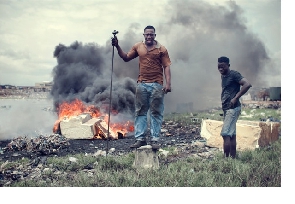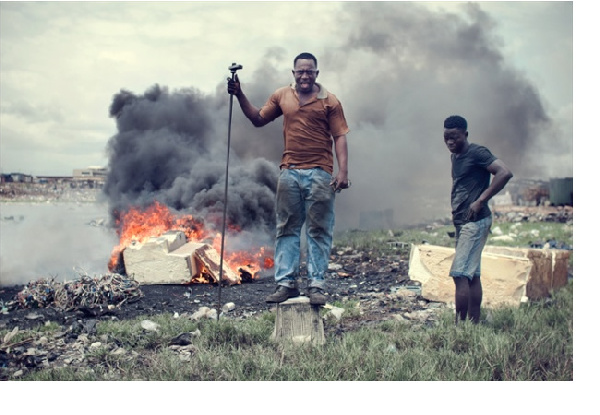 The writer says burning waste releases harmful pollutants that pose serious risks to human health
The writer says burning waste releases harmful pollutants that pose serious risks to human health
Every day, toxic flames rise from waste dumps, poisoning the air we breathe and contaminating the soil and water we depend on. The unregulated practice of open waste burning, especially in areas such as Agbogbloshie in Ghana, is a major public health and environmental crisis. If we fail to act, the long-term health and environmental devastation will be irreversible.
Health Impacts of Open Burning
Burning waste releases harmful pollutants that pose serious risks to human health. Research on waste-burning practices in Agbogbloshie has shown that exposure to these pollutants can lead to a range of health problems, including:
I. Lung damage, difficulty in breathing, and other symptoms like coughing and chest discomfort.
II. Increased risks of heart disease and cancers over time.
III. Weakened immune system and hormone disruption from chemicals like dioxins and furans.
IV. Pregnancy complications, birth defects, and slower growth and brain development in children.
Environmental Consequences
Open burning of waste in Ghana severely harms the environment. Toxic smoke and ash pollute the air, soil, and water, reducing crop growth and threatening the safety of food supplies. Toxic heavy metals released from burned waste contaminate rivers such as the Odaw, threatening ecosystems and communities.
Socioeconomic Consequences
Open burning and poor waste management have serious economic and social impacts. The sight and smell of burning waste deters investors and tourists, shrinking economic opportunities and deepening poverty. Poor waste management leads to frequent flooding, requiring costly government interventions. Low-income communities suffer the most, deepening social inequalities.
A Call to Action: Sustainable Waste Management Solutions
We call on policymakers and stakeholders to take three important steps: improve waste management, improve enforcement, and educate communities.
• Improve Waste Collection and Recycling – The government and relevant stakeholders should invest in adequate waste recycling facilities and programs to reduce reliance on crude waste management practices within communities.
• Strengthen Legislation and Enforcement –The central government, in collaboration with municipal authorities, should develop and implement policies that incorporate community monitoring and impose penalties on individuals engaged in open waste burning.
Empower communities through education – The Environmental Protection Agency should collaborate with community-based organisations to raise awareness about the dangers of open burning and promote behavioural change.
Conclusion
Ghana must act now to eliminate open waste burning and transition to sustainable waste management. By enforcing stricter regulations, improving waste infrastructure, and educating communities, we can create a cleaner, healthier future for all. The time for action is now—before another generation suffers the irreversible consequences of toxic waste burning.


